Eitan Arom: UCLA relations with POM Wonderful, donors overstep bounds

David Feinberg earned more than $100,000 from a pair of donors while serving as president of the UCLA Health System.
(Daily Bruin file photo)
By Eitan Arom
April 27, 2014 11:01 p.m.
This is a tale of two empires.
One is the UCLA Health System, a sprawling fiefdom of medical services flying the UCLA standard at locations from Malibu to Torrance. It’s headed by President David Feinberg, deemed by LA Weekly as “UCLA’s millionaire doctor.”
The second is the food-and-drink enterprise owned by Stewart and Lynda Resnick, valued by Forbes at $3.5 billion, and encompassing the pomegranate juice company POM Wonderful as well as an in-house advertising agency to hawk its products. The couple’s donations to UCLA total more than $16 million since 2000, earning them naming rights to the school’s neuropsychiatric hospital and a food law program.
The relationship between these two empires has become alarmingly cozy.
To begin with, state disclosure forms show that between 2010 and 2013, Feinberg was on the Resnicks’ payroll as a consultant, earning upwards of $100,000 from the power couple in 2011.
During this time, companies owned by the Resnicks bankrolled research at UCLA on the health benefits of pomegranate juice, including studies coauthored by Harley Liker, a doctor who had served as the Resnicks’ personal physician and medical director of POM Wonderful.
In turn, the Resnicks used studies at UCLA and elsewhere to tout in advertisements that pomegranate juice could reduce the risk of everything from heart disease to erectile dysfunction. That is, until an administrative law judge upheld a Federal Trade Commission complaint, ruling that POM had used deceptive advertisement and barring the company from making certain health claims.
The names of UCLA physicians and researchers appear multiple times in the FTC proceedings.
Anyone who has ever worn the letters “UCLA” should be concerned when those letters show up in federal injunctions.
UCLA’s reputation is not cheap. In fact, it would be difficult to calculate the number of state dollars that have gone into building and maintaining the good name of the Health System, which to its credit churns out not only patient care services, but also far-reaching clinical research.
The benefit of having a medical conglomerate as big as UCLA’s is obvious: It brings prominence and name recognition to the university. But that prominence also means UCLA’s reputation is in the hands of the clinicians, administrators and researchers that make up the system.
Feinberg’s $100,000 retainer sells that reputation at a major discount. His willingness to take money from the Resnicks splits his allegiance between the taxpayers that support UCLA and private interests that stand to gain financially from exploiting that name.
UCLA Health System spokespeople told The Bruin that no concerns have been raised about POM Wonderful-sponsored research through either the Conflict of Interest Review Committee or the Office of Compliance. But rather than prove that no conflict exists, this silence only proves that the policies protecting the integrity of UCLA research are going unenforced.
UCLA policy precludes even “apparent conflict of interest.” If an outright monetary relationship between UCLA Health System’s top officer and the direct beneficiaries of UCLA research is not an apparent conflict of interest, it’s hard to say what is.
Taken separately, the Resnicks’ philanthropy, Feinberg’s consultant gig and POM Wonderful’s sponsorship of UCLA research are pretty much innocuous. Taken together, they form an alarming pattern.
Add an FTC investigation to the mix, and the situation is suspect enough to merit attention from UCLA’s leadership.
The Los Angeles Times reported Friday that Consumer Watchdog, a Santa Monica consumer advocacy group, is asking state officials to investigate whether UCLA’s power to monitor industry-sponsored research should be outsourced to an independent third party.
That would certainly be an improvement to the current blind-eye policy in evidence. But if UCLA wants to maintain internal control of its research agenda, as it should, it needs to make sure that agenda responds only to the public interest and not to its donors and sponsors.
It can start by reviewing the university’s relationship with POM Wonderful, which includes ongoing studies funded by the Resnicks about the health benefits of pomegranate juice.
When the federal government suspects impropriety, it appoints a special prosecutor. UCLA’s chancellor should appoint an individual or team to review the university’s policy on its relationship with industry before that power gets taken away from him.
If UCLA won’t take action, it falls to the University of California Office of the President to investigate. And if UC headquarters won’t step up, the state would be within its right to relieve the Health System of its internal ability to review conflicts.
Both taxpayers and members of the campus community have invested a good deal into building UCLA’s reputation. That’s an investment worth protecting.
Email Arom at [email protected] or tweet him @Eitan_Arom. Send general comments to [email protected] or tweet us @DBOpinion.


